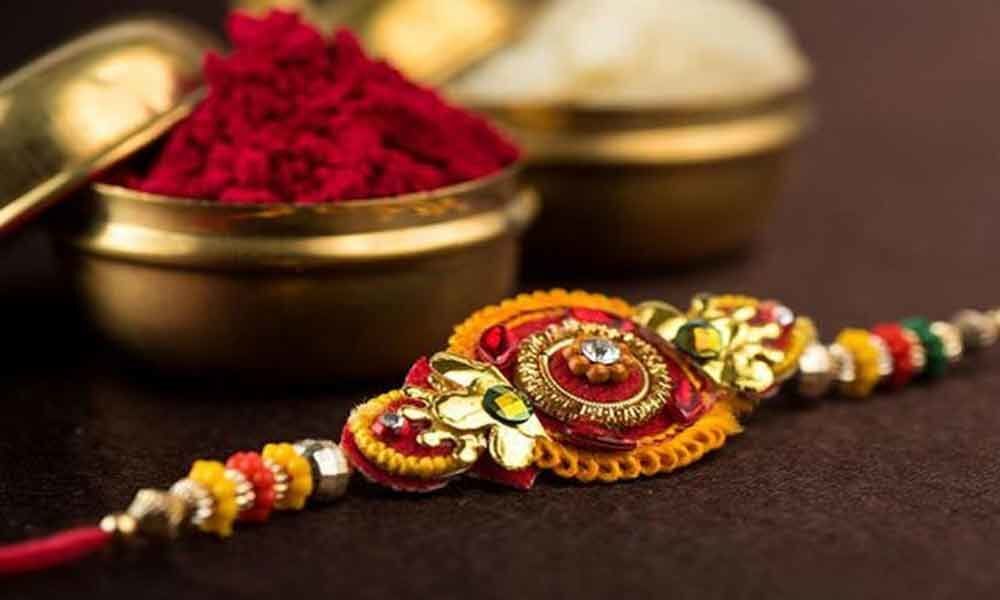In Mythology and History – the Fascinating Stories of Raksha Bandhan That You Probably Didn't Know

Much the same as most different celebrations in India, the historical backdrop of Raksha Bandhan is established in different fanciful legends and old stories.
Much the same as most different celebrations in India, the historical backdrop of Raksha Bandhan is established in different fanciful legends and old stories.
The legend follows back to a fanciful war between the devtas (Gods) and the asuras (devils). Whenever Indra, the ruler of devtas, was very nearly losing his kingdom to asura Vritra, he moved toward master Brihaspati, a Vedic period sage, to discover an answer.
The master stated, "See! The solution to your triumph lies in a consecrated string to be tied on your wrist fueled by the holy mantras on Shravan Purnima."
Indra's significant other, ruler Sachi, alluded to as Indrani in the Puranic writings tied the consecrated string of 'Raksha' on his hand, which drove the Gods to triumph.
Regardless of whether the principal custom of Raksha Bandhan started with a lady tying a string on the wrist of her significant other, is as yet a puzzle. In any case, much the same as most different celebrations in India, the historical backdrop of Raksha Bandhan is established in different legendary legends and old stories.
What does Raksha Bandhan symbolize?
Starting from the Sanskrit expression 'रक्षाबन्धनम्,' Raksha signifies 'insurance' and Bandhan alludes to a 'bond' – the term essentially means an 'obligation of assurance'.
Seen on the full moon day of the Hindu luni-sunlight based month of Shravana, and the Gregorian schedule month of August, this promising day, throughout the years, has been related to commending the association between a defender and a protectee.
According to Hindu convention, it has been famously known to praise the adoration among siblings and sisters, who could conceivably be organically related. The sister ties a rakhi (a consecrated string) on her sibling's wrist and petitions God for his thriving, while the sibling gives her a token blessing and a guarantee to ensure her.
Who Tied the First Rakhi to whom? – A Mythological Theory.
Draupadi and Krishna:
One of the most well known Indian folklore legends is of Lord Krishna and Draupadi – the spouse of the five Pandavas. On Makar Sankranti, Krishna cut his little finger. Watching Krishna drain lavishly, Draupadi removes a piece of the last detail of her sari and tied it on his finger. Consequently, Krishna vowed to secure her. Krishna's assistance to Draupadi was deified in folklore when at her unceremonious cheerharan (undressing), her sari continues getting broadened, which is the manner by which he answers her call for assistance.
Yama and the Yamuna:
Whenever Yama, the God of Death did not visit his sister the Yamuna, the stream goddess looked for assistance from waterway Ganga for a long time. Upon an update about his sister by Ganga, Yama chose to visit the Yamuna. Being thrilled by her sibling's landing, Yamuna arranged a plentiful gala for Yama and attached a rakhi to him. Enchanted, he asked his sister what she needed as a blessing. All she wanted was her sibling to visit her soon. Moved by his sister's adoration, he favored her with interminable life, thus the Yamuna, the longest and the second biggest tributary stream of Ganga, streams enthusiastically today.
Ruler Bali and Goddess Laxmi:
At the point when evil presence ruler Bali, a lover of Lord Vishnu, approached him for security, Vishnu did it under the camouflage of Bali's concierge. Away in Vishnu's homestead, his better half Laxmi missed him. In this way, she masked herself as a lady looking for asylum and moved toward Bali, who opens his royal residence entryways for her. She is the goddess of riches, thrived Bali's home.
On the full moon day of Shravana, when Laxmi tied a string of hued cotton on Bali's wrist for his security, he asked her what she wanted as a blessing. Laxmi basically indicated the guardian who uncovered his actual personality. Bali stayed faithful to his commitment and requested that Vishnu return home with Laxmi, however, Vishnu thus vowed to go through four months of every year with Bali.
Peruse more: We Indians Love Our Dal. Be that as it may, Do You Know the Fascinating History of Our Favorite Comfort Food?
Raksha Bandhan in History
Roxana and King Porus
At the point when Alexander the Great attacked India in 326 BC, his better half, Roxana, sent Porus, the lord of the Kauravas, a consecrated string and asked him not to hurt her significant other on the front line. In the Battle of the Hydaspes, when Porus saw the rakhi all alone wrist, he limited himself from assaulting Alexander. Despite the fact that Porus lost the fight, he won Alexander's regard and respect, who not just reestablished him as a satrap (senator) of his own kingdom, yet in addition, allowed him territory over terrains toward the south-east stretching out until the Hyphasis (Beas).
Sovereign Humayun and Queen Karnavati:
history-Raksha-Bandhan
After the passing of her better half Rana Sangha, ruler Karnavati turned into the authority of Mewar and ruled it for the sake of her senior child Vikramjeet. At the point when Bahadur Shah of Gujarat assaulted Mewar for the subsequent time, the ruler started searching for help from different kingdoms. Karnavati at the time wrote to Mughal Humayun for assistance, sending him a rakhi and looked for security. Regardless of Humayun's dad, Babur, crushing Rana Sanga in 1527, and the Mughal sovereign himself being in another military crusade, he deserted everything to give his consideration to Mewar to help Karnavati.
The Mughal ruler was grief-stricken when he couldn't make it on schedule. The Rajput armed force was crushed in Chittor, and Rani Karnavati had immolated herself in the Rajput custom of Jauhar. In any case, later, Humayun reestablished the kingdom to Karnavati's child, Vikramjit.
Rabindranath Tagore and the Bengal segment of 1905:
In 1905, when the Partition of Bengal isolated the country, Nobel Laureate Rabindranath Tagore began Rakhi Mahotsavas to observe Raksha Bandhan and reinforce the power of profound devotion and fellowship among Hindus and Muslims of Bengal. He additionally encouraged them to challenge the Britishers. The segment may have separated the state, however, his custom proceeds in parts of West Bengal, as individuals attach rakhi to their neighbors and dear companions.
Writing the imagery of rakhi, Tagore composes:
The adoration in my body and heart
For the world's shadow and light
Has remained over the years.
With its considerations and its expectation it has tossed
It's very own language
Into blue skies.
Tags: Raksha Bandhan, Hindhu Mythology, Culture, Festivals,
It lives in my delights and despairs
In the spring night's buds and blossoms
Like a Rakhi-band
On the Future's hand.
Present Day:
history-Raksha-Bandhan
Sisters bind rakhis to sisters.
Raksha Bandhan festivities may have started in the Vedic time, however the custom proceeds in present-day India with full swing and intensity. From a basic sacrosanct string called kalawa to current e-rakhis sent to siblings to another country, Raksha Bandhan has radically developed, yet keeps on reinforcing bonds.
As times are changing, sisters have seen binds rakhis to their kin, however wearing some themselves as well.
Man or lady, doesn't make a difference, each defender merits a rakhi, no?
Who attached the first rakhi to whom may keep on being a secret, however, don't let that prevent you from binds one to whomever you need.
Upbeat Raksha Bandhan!














